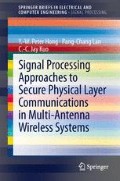Abstract
This chapter provides an overview of the so-called discriminatory channel estimation (DCE) scheme, that is, a training and channel estimation scheme utilized to enhance physical layer secrecy in the channel estimation phase. Instead of focusing on the data transmission, as done in most works introduced in previous chapters, the DCE scheme focuses on the training signal design in the channel estimation phase and aims to discriminate the channel estimation performance at the destination and the eavesdropper. By allowing the destination to obtain a better channel estimate than the eavesdropper, the difference in signal qualities at the two receivers will increase, leaving more room for secrecy coding in the data transmission phase.
Access this chapter
Tax calculation will be finalised at checkout
Purchases are for personal use only
References
Hassibi B, Hochwald B (2003) How much training is needed in multiple-antenna wireless links? IEEE Trans Inf Theory 49(4):951–963
Yoo T, Goldsmith A (2006) Capacity and power allocation for fading MIMO channels with channel estimation error. IEEE Trans Inf Theory 52:2203–2214
Chang T-H, Chiang W-C, Hong Y-WP, Chi C-Y (2010) Training sequence design for discriminatory channel estimation in wireless MIMO systems. IEEE Trans Signal Processing 58(12):6223–6237
Huang C-W, Chang T-H, Zhou X, Hong Y-WP (2013) Two-way training for discriminatory channel estimation in wireless MIMO systems. IEEE Trans Signal Processing 61(10):2724–2738
Barhumi I, Leus G, Moonen M (2003) Optimal training design for MIMO OFDM systems in mobile wireless channels. IEEE Trans Signal Processing 51(6):1615–1624
Kay SM (1993) Fundamentals of statistical signal processing: estimation theory. Prentice Hall, Upper Saddle River
Boyd S, Kim S-J, Vandenberghe L, Hassibi A (2007) A tutorial on geometric programming. Optim Eng 8:67–127
Stüber GL (2011) Principles of mobile communication. Springer, Berlin
Zhou X, Lamahewa T, Sadeghi P, Durrani S (2010) Two-way training: optimal power allocation for pilot and data transmission. IEEE Trans Wireless Commun 9(2):564–569
Horn RA, Johnson CR (1991) Topics in matrix analysis. Cambridge University Press, Cambridge
Author information
Authors and Affiliations
Corresponding author
Rights and permissions
Copyright information
© 2014 The Author(s)
About this chapter
Cite this chapter
Hong, YW.P., Lan, PC., Kuo, CC.J. (2014). Secrecy-Enhancing Channel Estimation in Multi-Antenna Wireless Systems. In: Signal Processing Approaches to Secure Physical Layer Communications in Multi-Antenna Wireless Systems. SpringerBriefs in Electrical and Computer Engineering(). Springer, Singapore. https://doi.org/10.1007/978-981-4560-14-6_5
Download citation
DOI: https://doi.org/10.1007/978-981-4560-14-6_5
Published:
Publisher Name: Springer, Singapore
Print ISBN: 978-981-4560-13-9
Online ISBN: 978-981-4560-14-6
eBook Packages: EngineeringEngineering (R0)

